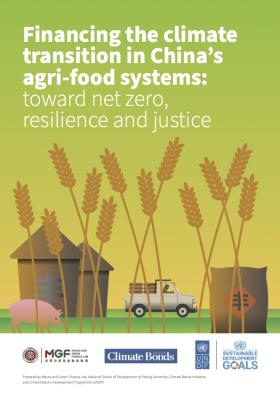
As the effects of climate change intensify, the agrifood sector faces mounting challenges. From safeguarding food security to enabling a just, low-carbon transition, agriculture is pivotal in the global effort to combat climate change. However, despite its importance, the sector remains underfunded in climate finance initiatives. Bridging this gap is essential, and Climate Bonds’ new report, “Financing the Climate Transition in China’s Agrifood Systems: Toward Net-Zero, Resilience, and Justice,” highlights how the sustainable finance sector can facilitate and encourage the agri-food transition in China.
This report, co-authored by the Macro and Green Finance Lab at Peking University’s National Development Research Institute, the United Nations Development Programme (UNDP), and the Climate Bonds Initiative, explores how innovative financial tools can support China's agrifood systems in transitioning toward net-zero emissions, greater climate resilience, and social inclusivity. The report also identifies major barriers to progress and proposes targeted recommendations for policymakers, financial institutions, and stakeholders.
 Why Agrifood Systems Matter
Why Agrifood Systems Matter
The report underscores the agrifood sector’s critical role in addressing climate change, highlighting its dual challenges: mitigating emissions and adapting to growing climate risks. With global climate finance for the sector amounting to just 4.3% (around $28.5 billion in 2020), funding falls dramatically short of the sector’s needs. In China, where small and micro-entrepreneurs like farmers and food processors dominate, these challenges are even more pronounced due to financial and technological constraints.
While closing this funding gap, financial mechanisms must incorporate the principles of a just transition to ensure that vulnerable communities benefit equitably from climate finance initiatives.
A Focus on Transition Finance
One of the report’s key highlights is the role of transition finance in catalyzing change. As one of China’s priority sectors for transition finance, agriculture is receiving increasing attention from policymakers. The People’s Bank of China (PBOC) has been instrumental in laying the groundwork for a transition finance system, and while current efforts focus on loans and bonds, the report identifies significant opportunities to diversify financial instruments.
By fostering the issuance of transition bonds and designing green finance instruments tailored to the agrifood sector, Climate Bonds aims to direct much-needed capital toward projects that promote net-zero emissions, resilience, and equity.
Breaking Down Barriers: Key Challenges and Recommendations
The report identifies the main bottlenecks preventing financial support for climate transformation in China's agri-food systems, including a lack of climate-related information disclosure in the agri-food sector, large agri-food companies not yet having credible transformation plans (especially incorporating Scope 3 emission reductions and improving the climate resilience of their supply chains), and insufficient policy incentives.
In order to address these bottlenecks, better policy synergies among relevant government departments, such as finance, treasury and industry, are needed. To this end, the report makes the following policy recommendations.
- Regulators should upgrade climate information disclosure in the agri-food sector, including the development of greenhouse gas accounting standards for agri-food, climate information disclosure requirements, and the establishment of a monitoring system;
- Regulators should guide and support agri-food entities in developing credible transition plans, including clarifying relevant regulatory requirements and providing technical support;
- The government should strengthen policy incentives, including formulating transition finance incentives to focus on supporting the climate transition of the agri-food supply chain as a whole. Additionally, the government should leverage the synergies between transition finance policies and inclusive finance policies to jointly support small and micro-enterprises of the agri-food system in the climate transformation and tilting the existing agricultural support policies towards agri-food climate-transformation economic activities, which would reinforce the government's role as an agri-food sector sustainable bond issuer.
A Roadmap for Action
“Financing the Climate Transition in China’s Agrifood Systems” provides a roadmap for addressing one of the most pressing issues in global climate finance. It calls for collective action to scale up investments, align policies, and create inclusive financial systems that leave no one behind.
As the world races to meet the 2030 Agenda for Sustainable Development, transforming China’s agrifood systems into a net-zero, climate-resilient, and inclusive model is both a challenge and an opportunity. The newly launched report underscores the urgent need for financial innovation and policy alignment to achieve this vision.
The sector is poised to play a leading role in global climate action. The path forward lies in collaboration, innovation, and an unwavering commitment to a just and sustainable future.
